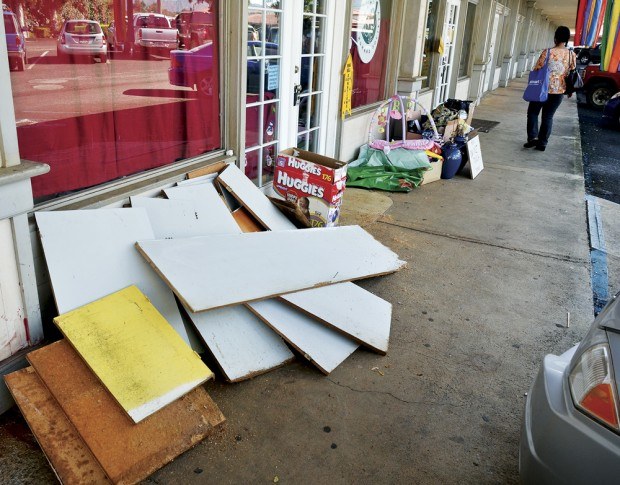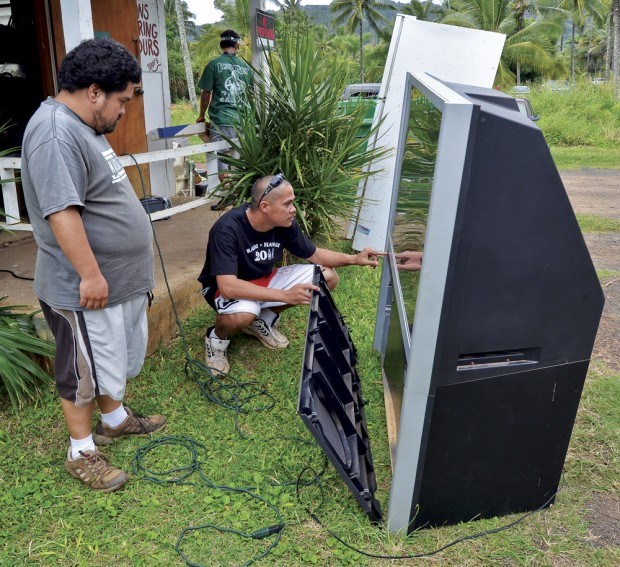LIHU‘E — Alleyways and dumpsters behind island thrift stores are overflowing with people’s personal garbage, transforming these sites into unofficial landfills and upsetting local merchants in the process. Soiled underwear, used sanitary pads, broken slippers, pieces of particle board, smashed
LIHU‘E — Alleyways and dumpsters behind island thrift stores are overflowing with people’s personal garbage, transforming these sites into unofficial landfills and upsetting local merchants in the process.
Soiled underwear, used sanitary pads, broken slippers, pieces of particle board, smashed electronics and non-functioning appliances are but a few of the unusable items that are illegally dumped at thrift stores daily, according to thrift shop managers.
“A lot of people just think its a dumping ground,” said Rowena Contrades-Pangan, co-director of Ho‘omana Thrift Store in Wailua. “Our bin gets dumped every Saturday. Today, it’s Monday, and we are already full. We appreciate that they consider us a donation area, but we are not a dumping area.”
Ho‘omana pays about $320 each month for a Dumpster and weekly refuse service, Contrades-Pangan said.
When trash is illegally discarded at thrift stores, the business is responsible for the expenses associated with hauling away the trash, said Donna Pickard, manager at the Kaua‘i Humane Society Thrift Store.
Employees and volunteers are forced to use their personal vehicles to dispose of the garbage, placing a strain on the thrift stores’ already stretched resources.
Store managers speculate the increase in illegal dumping is attributable to their convenient locations coupled with people trying to avoid garbage-service fees or seeking to discard large items, such as appliances or furniture.
“It does more hurt than good,” said Major Mario Reyes, Lihu‘e corps officer and Kaua‘i County coordinator for the Salvation Army Thrift Store. “The problem is when our doors are closed, people leave things and other people rummage through them creating a mess, which takes away from the donor’s intent.”
When appliances, such as non-working refrigerators, are left at the Salvation Army’s doorstep, Reyes believes people don’t understand the thrift store doesn’t have the manpower to fix, clean and repair them.
Thrift store managers have tried various techniques to deter illegal dumping, including putting up “No Dumping” signs, contacting the police and confronting people in the act.
“I’ve been sworn at and condemned,” said Contrades-Pangan about confronting people dumping their garbage illegally. “I’ve even had people throw their trash at me.”
Most of the illegal dumping happens when the thrift shops are closed, according to Pickard.
Usable items that are donated to thrift shops outside of store hours are often stolen or vandalized.
There have been incidents of people urinating on clothing, shattering glass from television and computer screens and scattering donations across the parking lot, creating unsafe working conditions for employees and patrons in the area, Pickard said. People who wish to donate usable items to thrift stores are encouraged to do so during business hours. In addition to ensuring their donations reach the thrift stores, people can receive a receipt that they can use to claim tax exemptions.
The County of Kaua‘i operates multiple refuse transfer stations throughout the island, including locations in Hanalei, Kapa‘a, Lihu‘e and Hanapepe. The Kekaha Landfill is open 7 a.m. to 5 p.m. daily. Illegal dumping carries a $250 penalty, according to Kaua‘i county ordinance.
“Our function is not to take unusable items,” Reyes said. “Our function is to take and reuse.”



